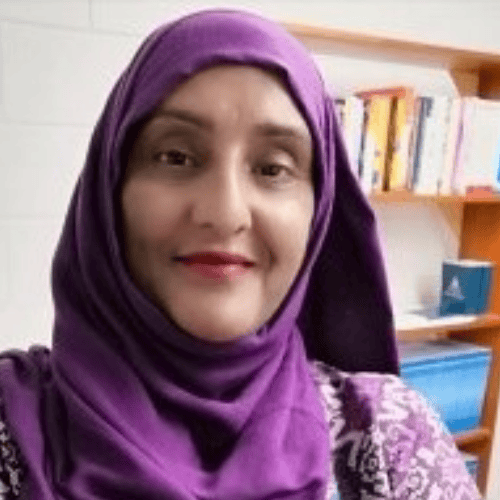
Dr. Natasha Khan is an academic, change maker and human rights defender in Fiji, and also the current Chair of the Pacific Human Rights Defenders’ Network. Natasha teaches at the University of the South Pacific (USP) in Fiji, and leads their programs on leadership, governance, and human rights.
USP is a regional university with dispersed campuses across 12 countries and 16 campuses across the Pacific and it plays a critical role in supporting and educating emerging Pacific leaders. Natasha has helped ensure that learning about human rights is a critical part of its curriculum and said the aim of her programs is to produce ethical leadership in the Pacific. Her programs now have over 6,000 alumni. Natasha’s role as a change-maker and supporting the development of change-makers is unmissable.
Natasha said the DTP training expanded her knowledge of business and human rights:
“Before participating in the program, I had limited knowledge on business and human rights. Following the program I was fascinated by it so much that I am now considering creating a university course on it in future as I believe this will benefit a lot of students who works for private and public sectors in the Pacific region.”
Natasha spoke highly of the DTP training and how it had helped her expand her network.
“When I was participating in DTP training, I fell in love with the work of the DTP and what it was doing. They brought in a diverse range of participants. I formed lifelong friendship with many of them. Particularly I was so glad to meet participants from PNG because PNG is not part of our university, so DTP helped me to create a network that I was not aware of.”
The Pacific Human Rights Defenders’ Network (PHRDN), which Natasha now Chairs, is one outcome of these DTP programs. Natasha was recently elected as the Chair of PHRDN:
“We are passionate about this network, at the moment without any funding, full -time staff and office, yet we organized three workshops where human rights defenders from the region participated and came up with future strategy for the network”.
Natasha says the network has plans to establish an office and to play a pivotal role in crystalising future human rights policies and legislation in the region.
Natasha’s deep commitment to human rights work was inspired by her father, a volunteer for NGOs and her parental home was always open to those who were in need. Inspired by her father and family values, Natasha was engaged with NGO and community work from a young age, helping to ground her academic expertise in human rights and governance.
DTP acknowledges the traditional custodians of the land on which we work, the Bedegal people of the Eora Nation. We recognise their lands were never ceded, and we acknowledge their struggles for recognition and rights and pay our respects to the Elders – past, present – and the youth who are working towards a brighter tomorrow. This continent always was and always will be Aboriginal land.
Aboriginal and Torres Strait Islander peoples should be aware that this website contains images or names of people who have passed away.
DTP acknowledges the traditional custodians of the land on which we work, the Bedegal people of the Eora Nation. We recognise their lands were never ceded, and we acknowledge their struggles for recognition and rights and pay our respects to the Elders – past, present – and the youth who are working towards a brighter tomorrow. This continent always was and always will be Aboriginal land.
Aboriginal and Torres Strait Islander peoples should be aware that this website contains images or names of people who have passed away.
Privacy Policy | Terms of Use | Disclaimer | Policies
© 2022 Diplomacy Training Program | ABN 31 003 925 148 | Web Design by Studio Clvr